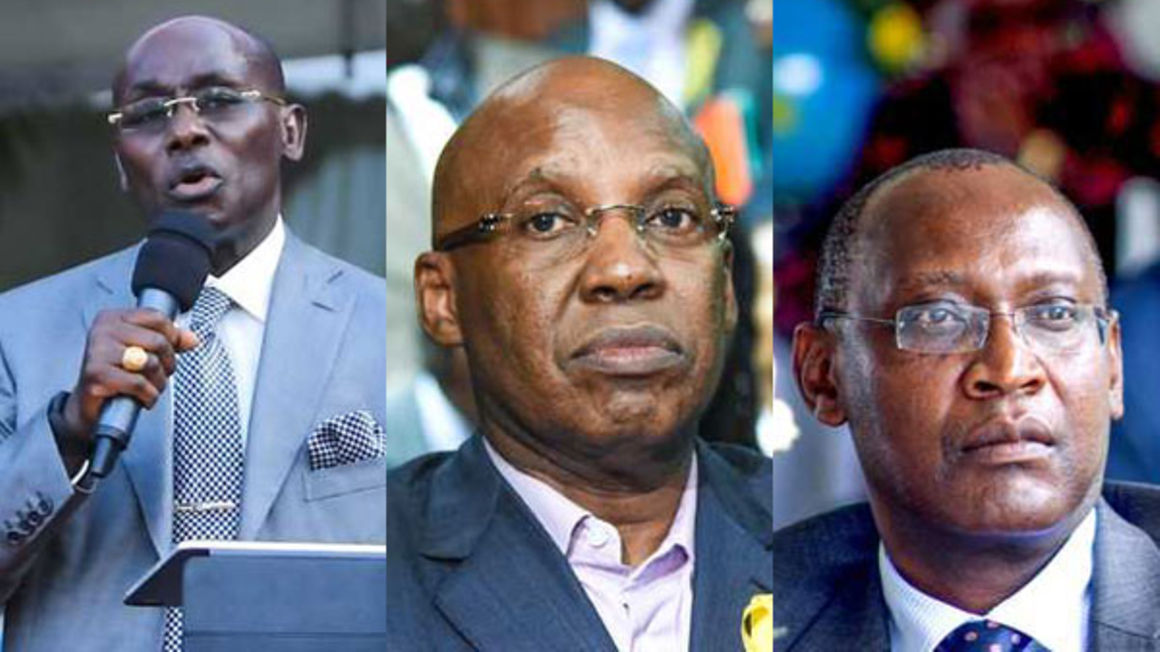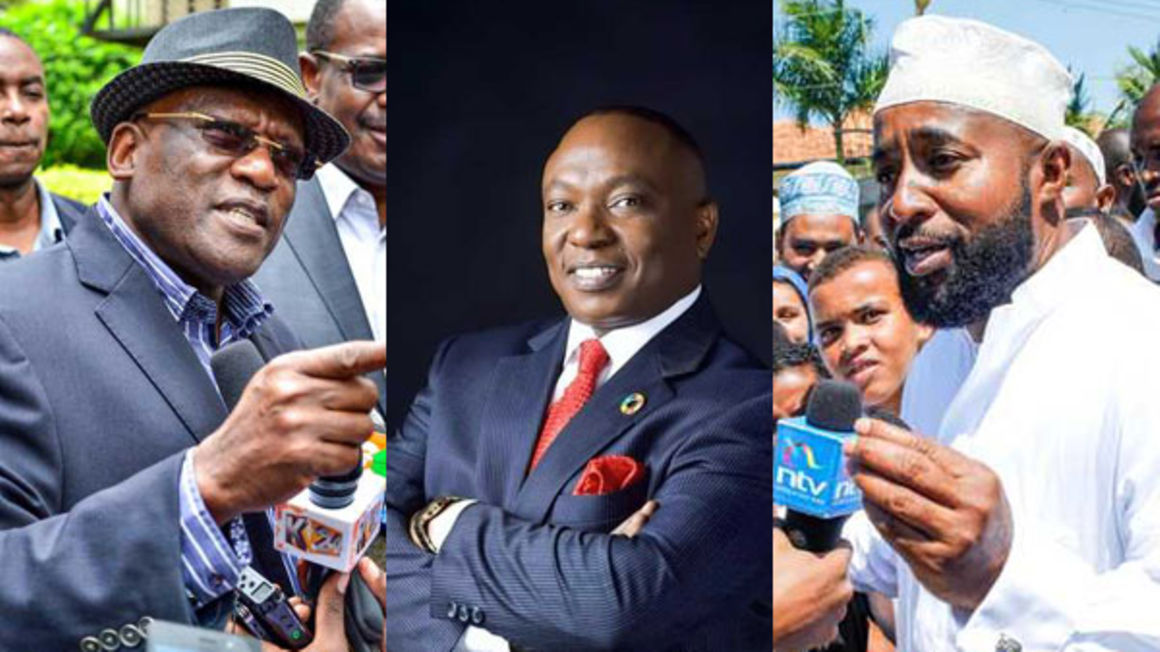
From left: Peter Muthoka, Jimi Wanjigi and Muhoho Kenyatta. PHOTOS | FILE | NATION MEDIA GROUP
Few desire to run for elective positions as they believe it is not worth the struggle. They, however, pull the strings behind the scenes – like conductors of an orchestra.
With generous campaign donations, election victories usually spawn payback. Supporters say funding campaigns is a matter of course but critics often claim state capture in the vicious manner the Gupta family is accused of having virtually taken over South Africa under President Jacob Zuma.
Kenya, like other countries, has a clique of mostly “old money” billionaires that exerts influence on politics and informs policy.
Days ago, Mr Andrew Ngirici, the husband of Kirinyaga Woman Representative Wangui Ngirici, asked Mr Peter Munga – the billionaire founder of Equity Group – not to meddle in the affairs of the county.
Mr Munga is in the process of reconciling Governor Anne Waiguru and the Kirinyaga County Assembly.
“Munga should be reminded that we are capable of solving our issues,” Mr Ngirici said.
TRUCE TALKS
The tycoons involved in the truce talks are associated with the Mt Kenya Foundation and the Gikuyu, Embu, Meru Association (Gema) groups.
Tebere Ward Representative Gudson Muchina said a meeting at Safari Park on Wednesday evening ended prematurely because Ms Waiguru’s team changed the agenda.
“We were to agree on the county budget stalemate but they brought up political issues. The governor’s team was made up of three ward representatives, the finance chief and her budget officer,” he said.

From left: Johnson Muthama, Richard Ngatia and Abubakar Joho. PHOTOS | FILE | NATION MEDIA GROUP
Ahead of the 2017 election, Mr Kenyatta hosted tens of the tycoons for a dinner at Safari Park Hotel. They reportedly raised Sh1 billion in just two hours.
The foundation also handed in its views to the Building Bridges Initiative (BBI) task force, some of which have been captured in the final document that the team is expected to hand the President this month.
President Kenyatta’s younger brother Muhoho takes care of the family business empire.
It is a poorly kept secret in government circles that he has a lot of say in politics. He prefers operating from the background but Cabinet secretaries and civil servants consult him.
The Rai family, a household name in the sugar and timber industry, is another case influence that goes far and beyond.
THREE FIRMS
The latest Sugar Directorate data shows three firms owned by the family controlled 45 per cent of the total sales in the last six months.

Equity Group founder Peter Munga (left) and chief executive James Mwangi at a past event. PHOTO | FILE | NATION MEDIA GROUP
Contacted, Mr Munga said business and politics are like Siamese twins.
“Without political stability and peace, no business would flourish. People want an environment they can plan and invest unhindered. Stable countries have done well,” he said yesterday.
Legal minds like Prof Yash Pal Ghai say the involvement of such tycoons in the electoral process is an affront to democracy.
“Any violation of the electoral law breaks democracy. Giving funds to get votes is violation of democracy. Paying money to secure a person’s vote is such violation,” he said.
In some jurisdictions, individuals and lobbyists funnel money into the established political system, thus manipulating elections.
In a 2019 report titled “State Capture”, the Africa Centre for Open Governance (AfriCOG) defines the capture in Kenyan context as a political project in which a well-organised elite network constructs a symbiotic relationship between the constitutional state and a parallel shadow state for its benefit.
“Essential to state capture is the existence of a crooked, conniving and reciprocal relationship between certain types of businesses and politicians. State capture creates a two-government country: there is an elected government and there is a shadow government – a state within a state,” says the report, which has the input of lawyer Wachira Maina, economist David Ndii and Mr John Githongo.
It added that capture networks radiate from two centres: the presidency, where the power is concentrated, and the Treasury, where the money management is centralised.
LOCAL BUSINESSMEN
“There is often a clique of local businessmen allied to political insiders, or alternatively, the favoured groups are shadowy, international companies whose shareholders are usually unknown. Capturing and controlling the presidency and the Treasury is essential to fashioning the criminal web necessary to repurpose government for the benefit of rent seeking elites,” the report added.
In countries like the US, these operate as the shadow party or the system lobbying for influential appointments and controlling big money tenders.
“America is under attack. Its institutions and values are under daily assault. But the principal culprits are not foreign terrorists. They are influential and powerful Americans secretly stirring up disunion and disloyalty in the shifting shadows of the Democratic Party,” say David Horowitz and Richard Poe in their book The Shadow Party: How George Soros, Hillary Clinton, And Sixties Radicals Seized Control of the Democratic Party.
For years, the Koch brothers have funded the Republican Party, influencing its political and public policy organisations in the end.
Mr Peter Muthoka has the pulse of Ukambani politics, commanding the respect of elected leaders – from ward representatives, MPs to governors.
He hosted elected and religious leaders from across lower Eastern on December 25 at Wiper party leader Kalonzo Musyoka’s Yatta farm, giving every MP Sh100,000 and ward representative Sh50,000.
Every bishop at the party reportedly received Sh500,000. Sources said the action by Mr Muthoka annoyed former Machakos Senator Johnson Muthama who had been the Wiper financier.
In an effort to starve 2017 National Super Alliance presidential candidate Raila Odinga of cash, the government trained its guns on businessman Jimi Wanjigi.
Mr Wanjigi was one of the cornerstones of Prof George Saitoti’s presidential campaign until the latter’s sudden death in a helicopter crash in 2012. He then shifted his support to Jubilee in 2013. They parted ways soon after.
Referred to as Mr Fix-it by associates, Mr Wanjigi was once untouchable, owing to his past links with security apparatus.
The rapprochement between Mr Kenyatta and Mr Odinga has thrust him back into the system, though not the deep state like before.
In a past interview with the Sunday Nation, Mr Musyoka said Mr Wanjigi was instrumental in brokering a deal between TNA leader Kenyatta and his URP counterpart William Ruto, which subsequently led to the formation of Jubilee.
Mr Paul Wanderi Ndung’u is among those pulling the strings from the background, given his proximity to power. The former chairman of betting firm Sportspesa, has majority shareholding in a number of companies and was one of the main financiers of the Jubilee administration.
President Kenyatta’s confidante David Murathe concedes that there is convergence between such billionaires and the running of the government.
“People in business must have one leg in politics to protect their interests. They would lose if they got the politics wrong,” he said before adding that such individuals have not held the Jubilee administration captive.
A former Cabinet minister who requested anonymity, did not have kind words for the power barons.
“They are behind most of the mega scandals the country has witnessed, dating back to independence,” he said.
Mr Muthama who runs a company specialising in mines and precious stones, admits to having funded a number presidential candidates. The former senator recently had a “messy divorce” with Mr Musyoka’s and Wiper. He was expelled from the umbrella party after being accused of going against the ideals of Wiper.
Megascope Healthcare chief executive Richard Ngatia is another titan in the corridors of power. He was elected president of the Kenya National Chamber of Commerce and Industry last year, a position that sees him influence trade policies as well as interact with Cabinet secretaries.
The Joho family in the Coast is moneyed. Other than having Hassan Joho as Mombasa governor, the family also sponsored Said Joho for Nyali seat though he lost to Mohamed Ali.
Additional report by Joseph Wangui

No comments:
Post a Comment